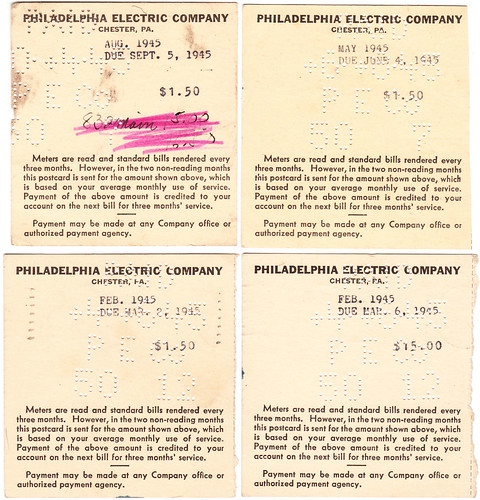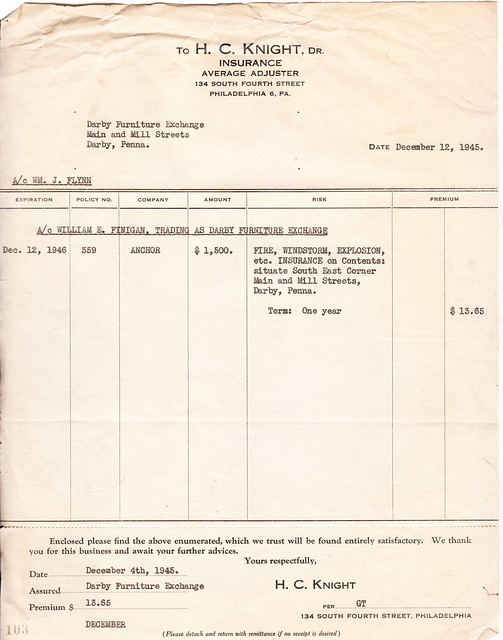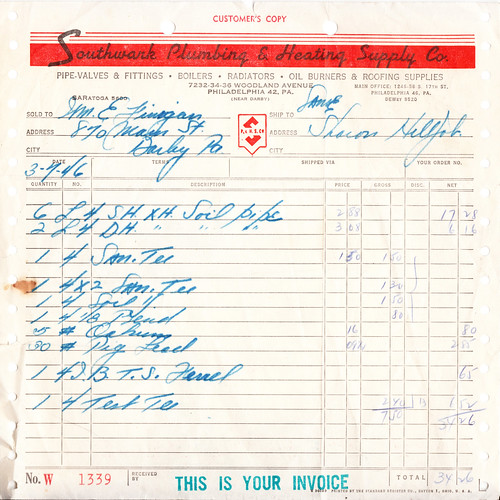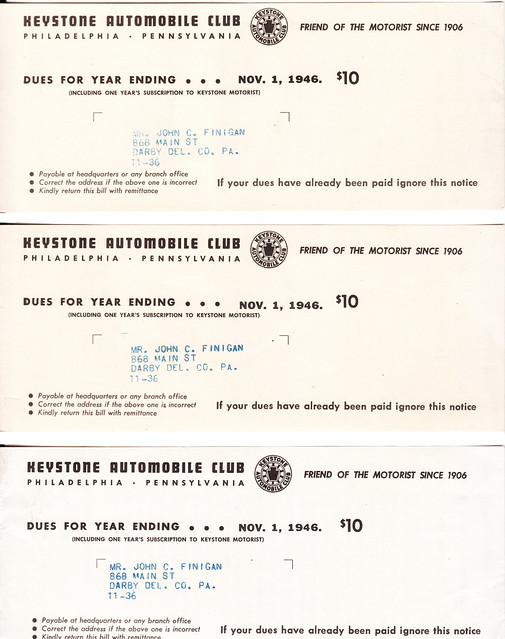

Sorry not to have blogged in a while. I've been busy with other projects (including the next feature-length Permanent Record piece for Slate, which I'll have more to say about in a minute).
What you see above are the front and back of a bill sent on June 8, 1945, from the Philadelphia Electric Company to one William E. Finigan, whose account was in arrears to the tune of $1.59. As you can see, Mr. Finnigan was given one week in which to settle the outstanding balance or else his lights would be turned off. Judging by the stern "Pay this" note on the back of the bill, someone in the Finigan household took this admonition seriously.
This bill is part of a batch of mid-1940s invoices, receipts, and bills, all relating to Mr. Finigan, that I recently acquired. They're all interesting, but "Pay this" -- for the whopping sum of $1.59 -- adds a note of pathos that easily makes this slip of paper my favorite of the batch. (And no, I didn't intend for "pathos" to echo "Pay this," although that's a nice bonus.)
This wasn't the only time Mr. Finigan had to be reminded to pay an overdue electric bill. In December of 1944, he received notice of an outstanding balance of $18.11, which he paid six days later. Note that the address on these documents is different than the one shown on the document at the top of the page, however, so maybe one was for his home and the other for his business (for all of these subsequent images, you can click to enlarge):


And on Aug. 14 of an unspecified year, he received a friendly reminder to remit an overdue sum of $8.60:

But I don't mean to imply that Mr. Finigan was a chronic deadbeat. Here are four electric bills stubs (complete with that beautiful hole-punch lettering you used to see on cancelled checks, paid invoices, and so on) that, near as I can figure, he paid on time:

Mr. Finigan apparently ran a furniture business. Here's a receipt for an insurance policy on his shop:

Here's a receipt from William's visit to a local hardware shop (listing yet another address), which I'm including mainly because (a) I like the logo at the top of the receipt and (b) I love the intensity of the carbon paper transfer handwriting:

William isn't the only Finigan whose paperwork ended up in this stash of documents. Here's a notice of an unpaid car insurance bill, only this one is addressed to John Finigan, at still another address (the Finigans apparently owned or rented a big chunk of Main St. in Darby). Were William and John brothers? Father and son? I'm not sure:

John Finigan, like William, apparently had some ongoing issues with prompt remittance. Here are three separate reminders to pay his annual 1946 dues for the Keystone Automotive Club (along with the fun information from the back of reminder):


That's all I have on the Finigans. I admit that it's not much of a narrative -- more questions than answers, and not particularly burning questions at that -- but I still enjoy it when I find these small batches of items all relating to a particular person or family. Ephemera like this is so disposable that I figure anything paperwork that's survived this long wanted to be found, wanted to tell its little story. So now I've done my part to help that process along.
Slate update: I've delivered the next PermaRec article to my editor at Slate, which means it should run within the next week or so. It's about two characters who I introduced last fall in the fourth article in the series. I'll have more to say about that in the next installment here on the blog.

No comments:
Post a Comment